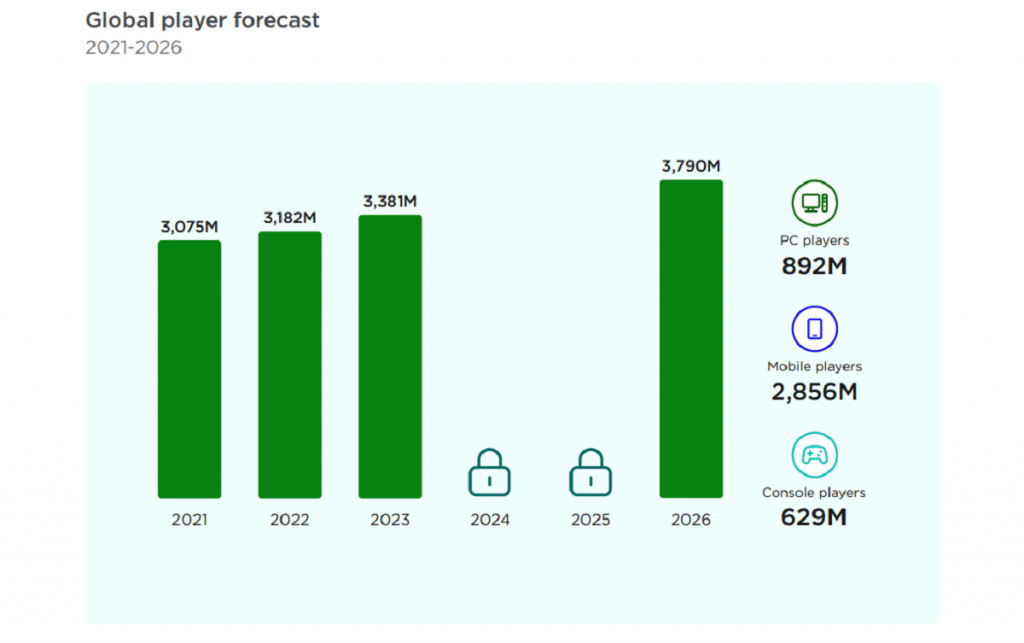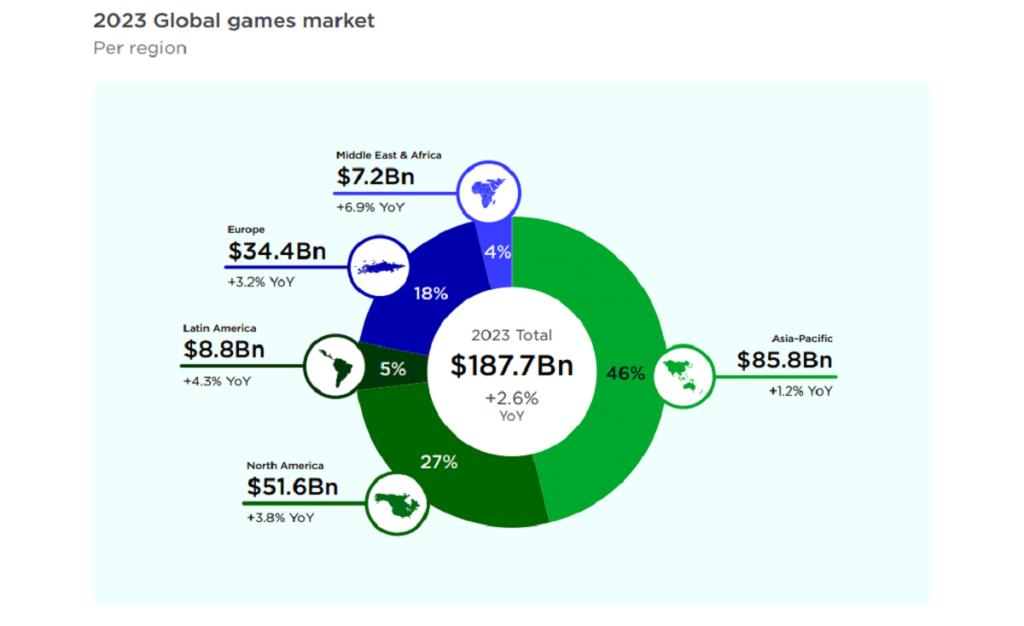Video game data firm Newzoo has released its Global Games Market Report 2023 which provides a glimpse into the world of gaming in 2023 and beyond. Newzoo’s report shows that 2023 will be an exciting year for the global games market as the overall number of players gets set to reach 3.38 billion, with the mobile platform leading the charge of this growth.
And as more paying gamers enter the fold, the market will also generate a massive $187.7 billion this year. Looking ahead, the report finds that the worldwide number of paying gamers will reach 1.66 billion in late 2026.
As the gaming industry continues to stabilise after some pandemic-induced setbacks, the worldwide games market is set to generate yearly revenues of $212.4 billion in 2026.

Global gamers count and games revenue
Newzoo’s data also shows the regional players count with Asia-Pacific accounting for more than half of players worldwide having 1.789 billion gamers (53%), thanks to huge markets like India and China.
This is followed by the Middle East and Africa’s 574 million (17%), Europe’s 447 million (13%), Latin America’s 335 million (10%), and North America’s 237 million gamers amount to (7%) of the overall 3.381 billion gamers across the world.
As far as revenues go, the report finds that mobile will remain gaming’s most significant segment by consumer spending by far, accounting for just under half of the entire global market with $92.6 billion (49%). Console takes second with $56.1 billion (30%), Downloaded/boxed PC games is third with $37.1 billion (20%) while Browser PC games amassed $1.9 billion (1%) of the estimated $187.7 billion gaming revenue of 2023.
For regional revenue performance, Asia-Pacific takes charge once again with $85.8 billion (46%), North America $51.6 billion (27%), Europe 34.4 billion (18%), Latin America $8.8 billion (5%), and lastly Middle East & Africa reached $7.2 billion (4%) of games revenue. The report estimates that gaming revenue will reach $212.4 billion in 2026.

AI and the future of gaming
Ever since OpenAI released ChatGPT to the public in late 2022, generative AI is gradually making its way to a globally adopted technology thanks to its hyper-realistic and believable content that even companies like OpenAI have had a tough time distinguishing AI-generated content from human assets.
“One day, creating entire games from the ground up may be possible using generative AI,” according to the report. Newzoo writes that the game development community’s current response to generative AI ranges from optimism (how AI can be used to speed up the development process and open up more room for creativity) to pessimism (concerns surrounding the ethical use of AI which would lead to job automation and layoffs, which is already common throughout this year).
Prominent voices have spoken about the impact of AI with Activision Blizzard’s CEO Bobby Kotick saying that AI will have a, “Profound positive impact” on gaming. On the other hand, EA’s CEO Andrew Wilson has cautioned that AI could lead to, “Displacement of the workforce.”
Integrating AI to cut costs
The report touches on the fact that making video games, especially AAA games is expensive and can take a lot of time, sometimes more than five years. Marketing these games also adds to the cost, with some titles costing hundreds of millions.
To save cost, many game developers are starting to utilise generative AI and even more plan to use it in the future as the nascent technology can help companies develop games faster. For instance, an artist can create one thing, like a tree, and then use AI to make lots of different versions, leading to less work for the artist and saving time.
Generative AI can also help with ideas and art. Rather than starting from scratch, an artist can tell the AI what they want, such as ‘Generate a goblin character with a Viking-inspired style.’ The AI then comes up with lots of ideas that the artist can choose from.
Using generative AI could mean that game studios need fewer artists, but they can make quality assets faster. It might also make it easier to hire new artists, even if they’re not experts in a specific style.
The report went on to suggest that we might also hear more AI voices in games, instead of real people. This could mean fewer jobs for voice actors, especially in smaller games. But big, fancy games like The Last of Us and God of War will still use real actors because they need that Hollywood quality. Smaller games and mods, though, might use AI voices to make the game world feel more alive.
Efficiency versus authenticity
In the next few years, generative AI might take over some of the work in creating CGI and video production in games. Small groups of artists using AI could make these videos faster and better than larger CGI-specialised teams, according to the report. This might also help update older games that were too expensive to fix before.
However, Newzoo writes that behemoth game developers might want to maintain the old way of making games to keep things ‘authentic’.
“The long-term effects of AI technology are less certain. Still, it’s safe to assume that in the not-too-distant future, developers and even laypeople will be able to generate entire games using generative AI,” the report reads.
“As tools become cheaper and easier to use, the barriers between developers and gamers will continue to break down, and the global industry may become more community generated.”
You can download a free 52-page version, or purchase the full 150-page report.
Isa Muhammad is a writer and video game journalist covering many aspects of entertainment media including the film industry. He's steadily writing his way to the sharp end of journalism and enjoys staying informed. If he's not reading, playing video games or catching up on his favourite TV series, then he's probably writing about them.






































